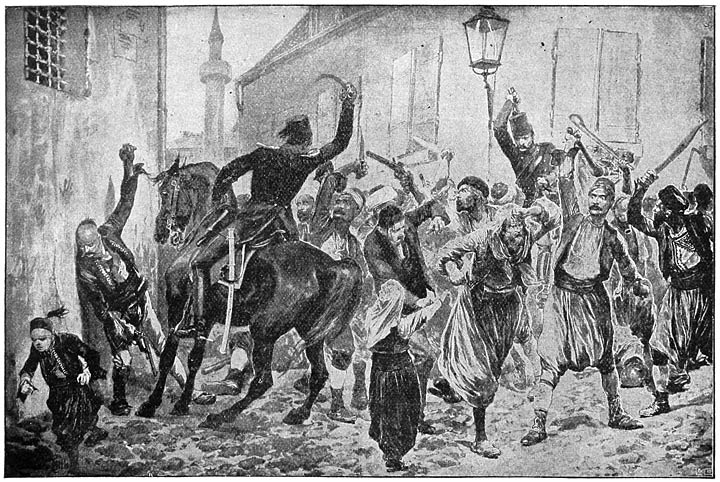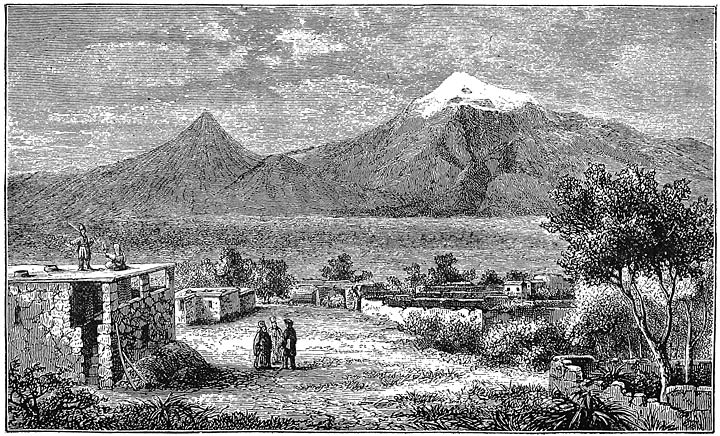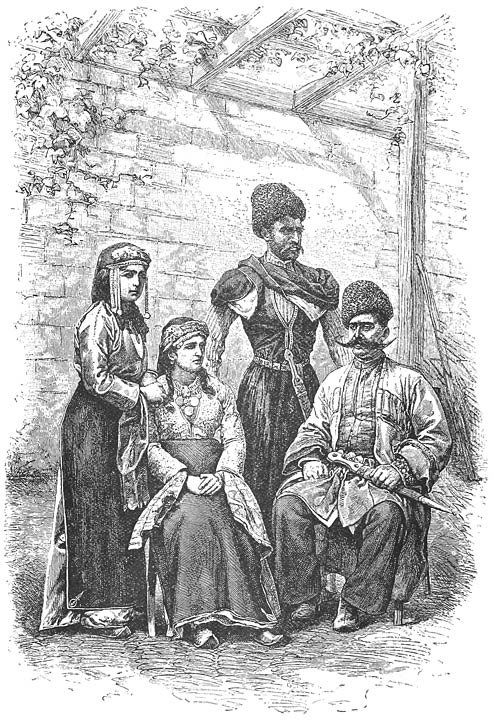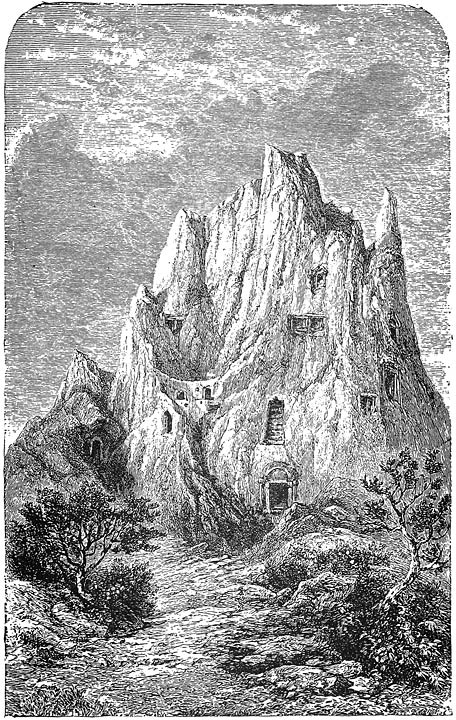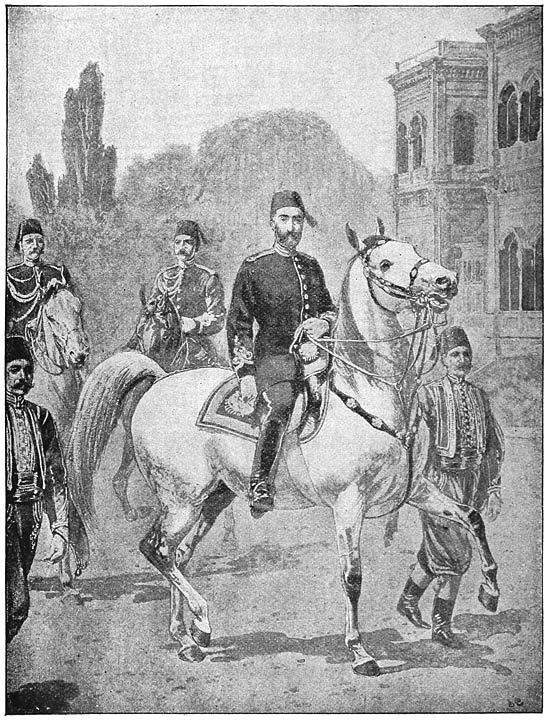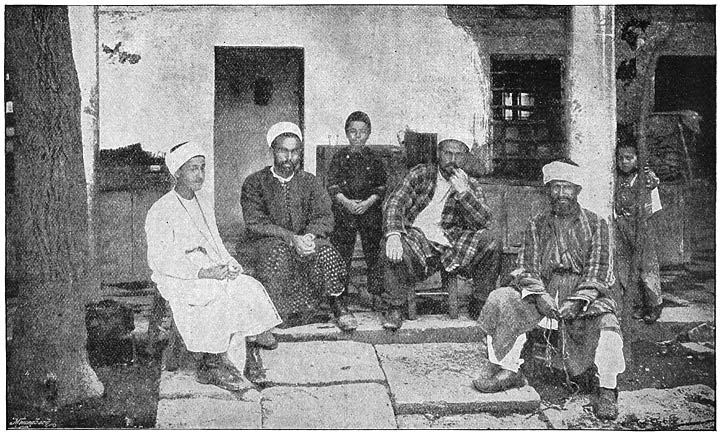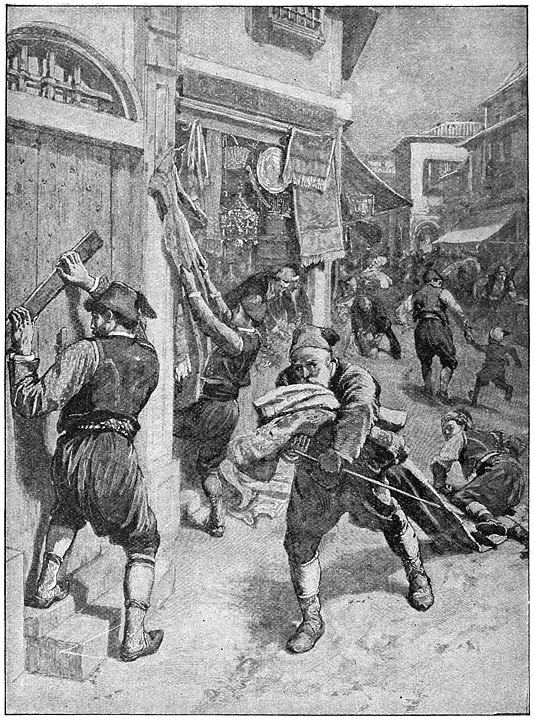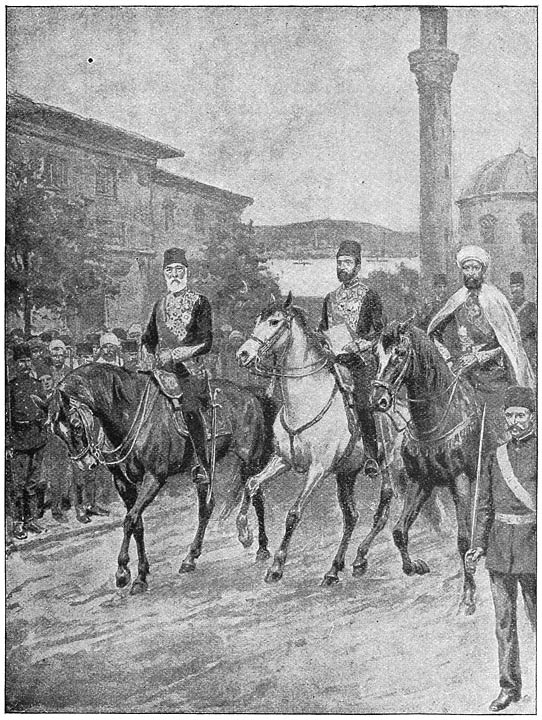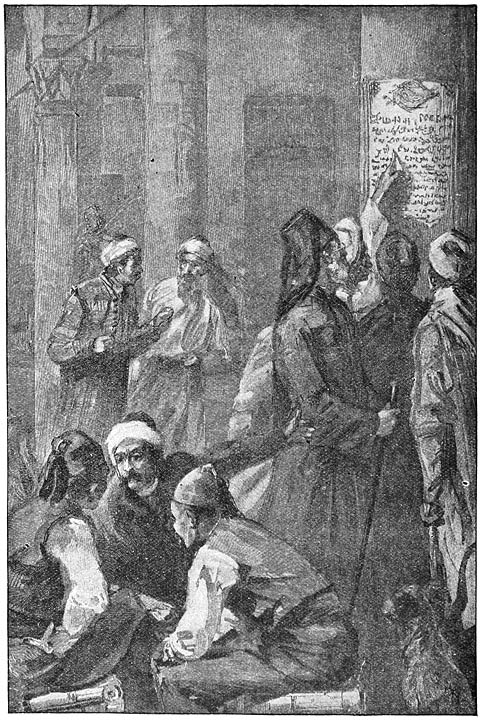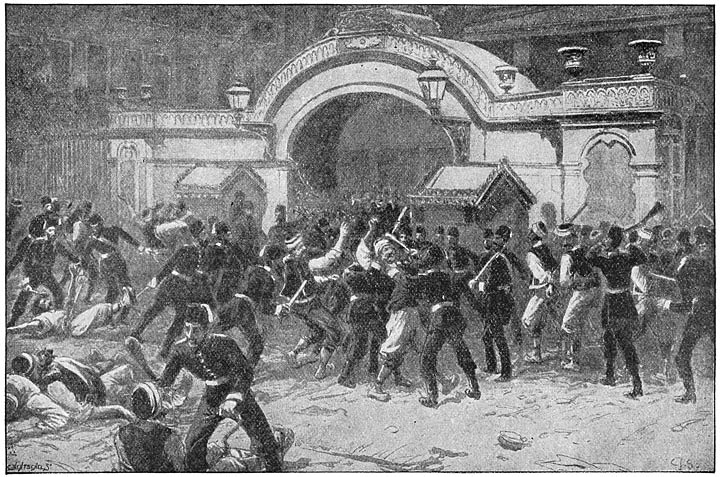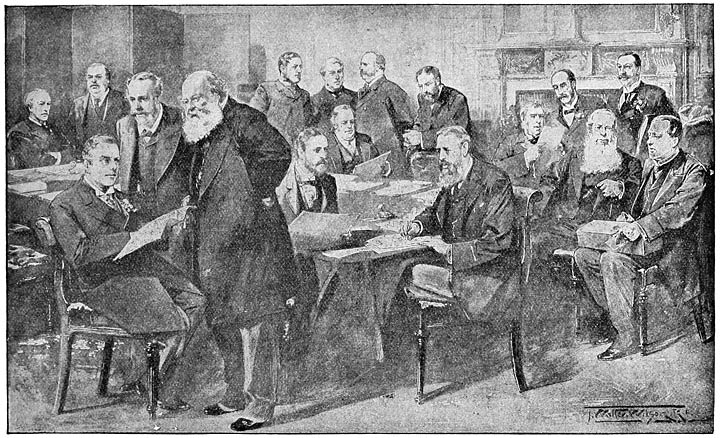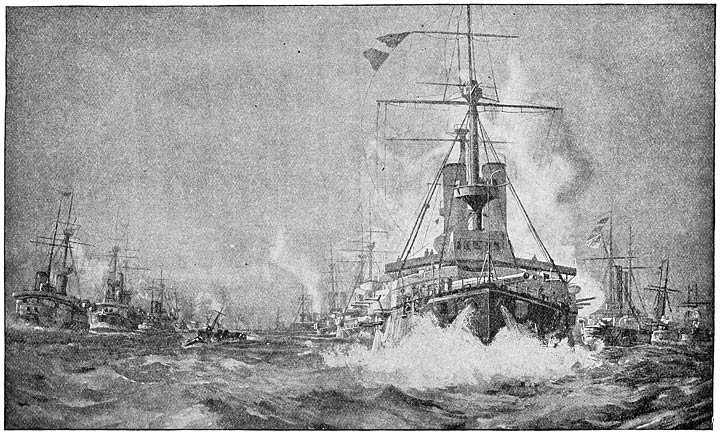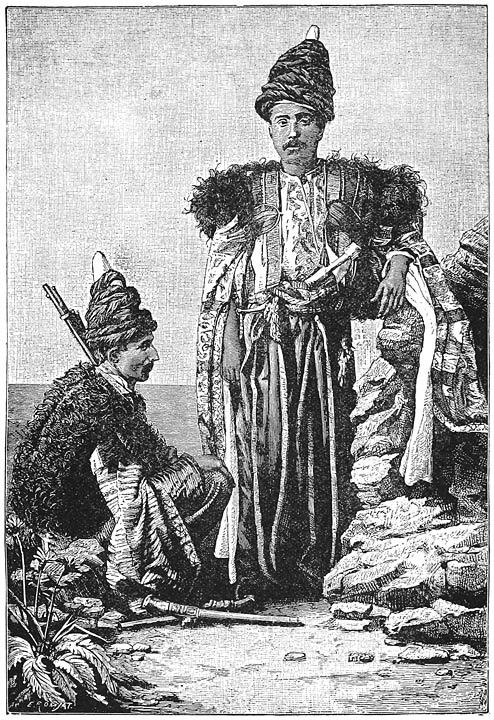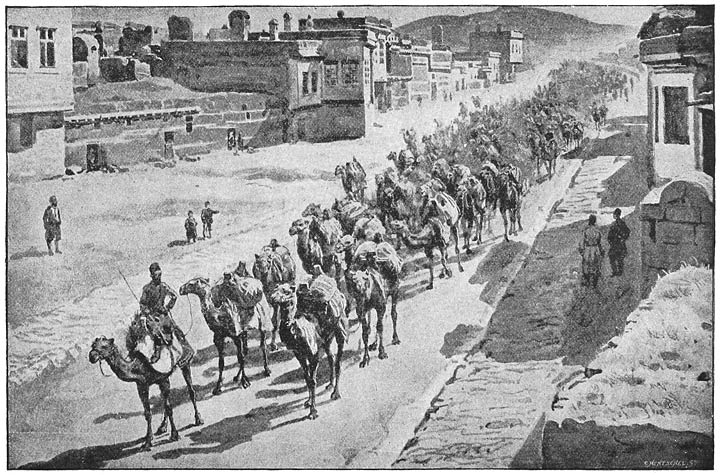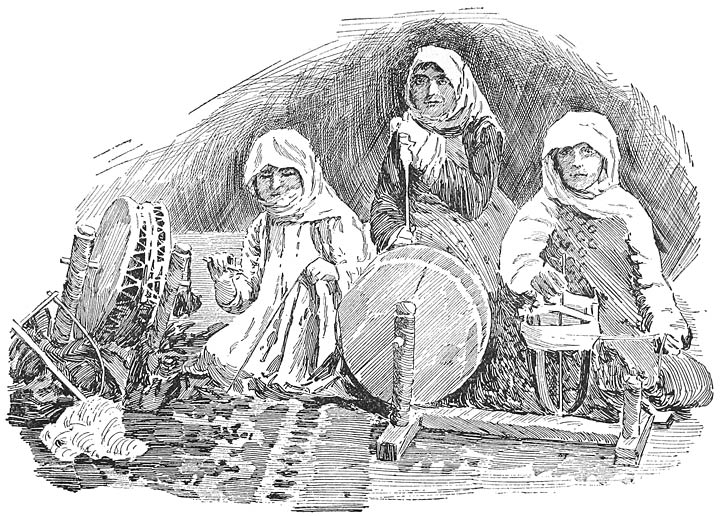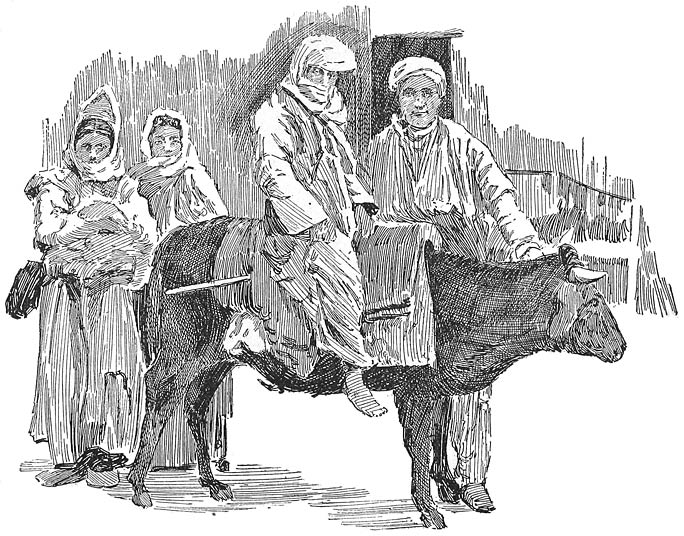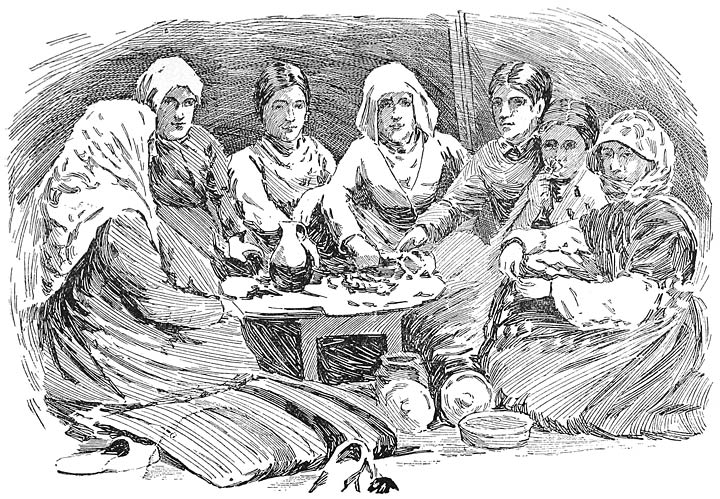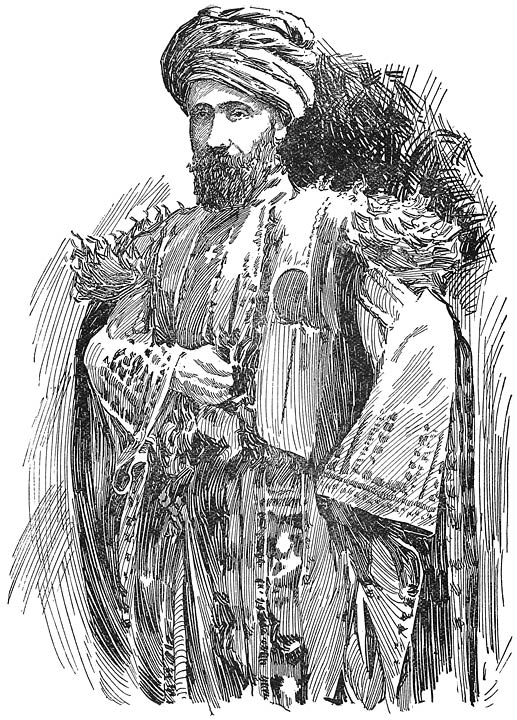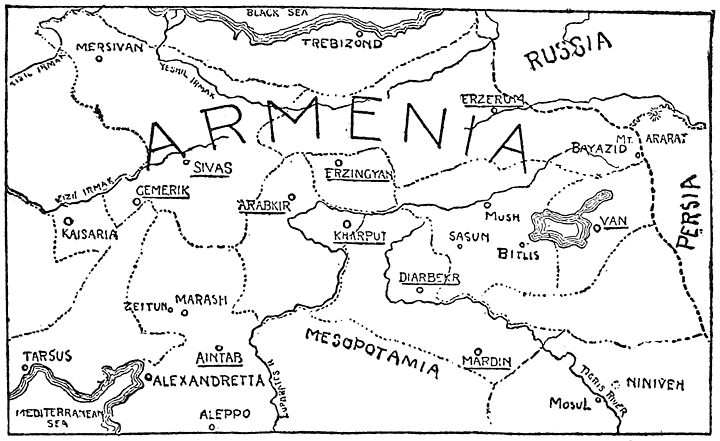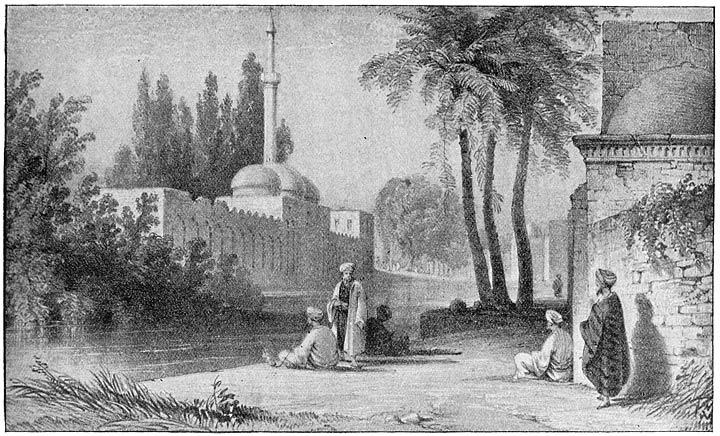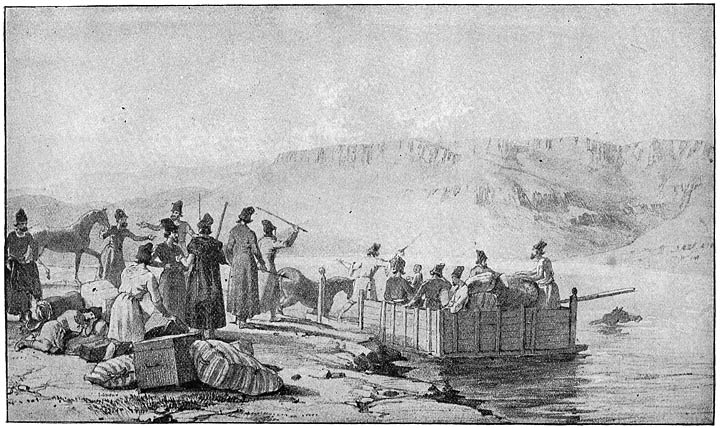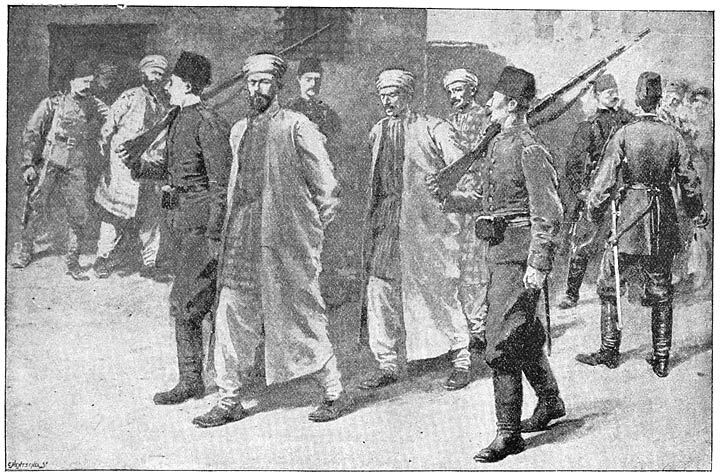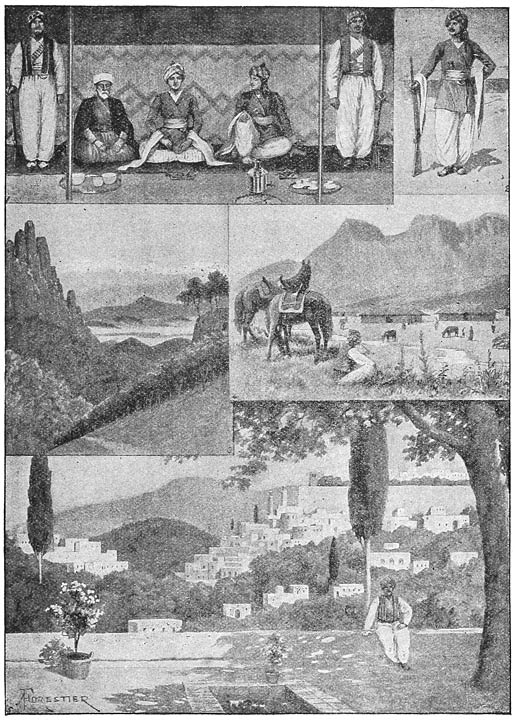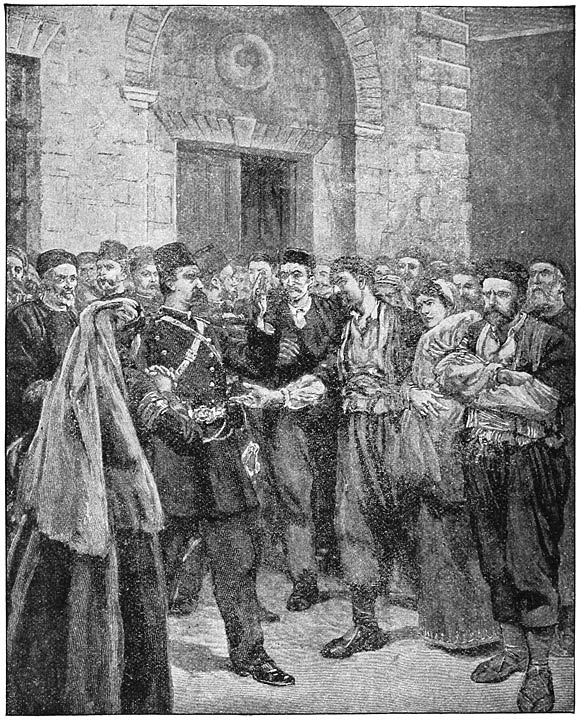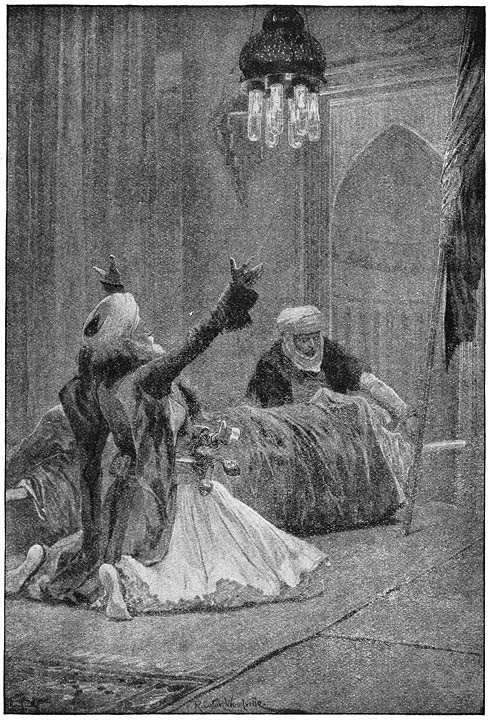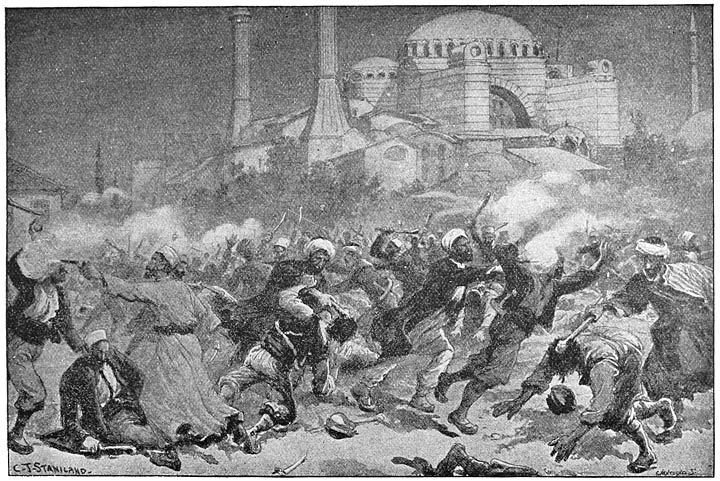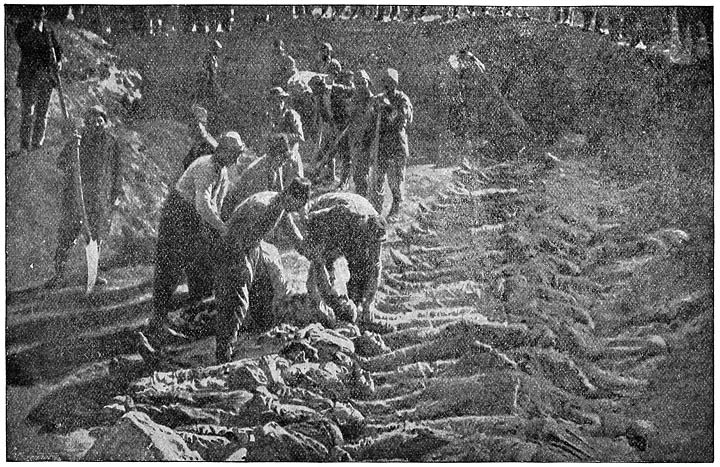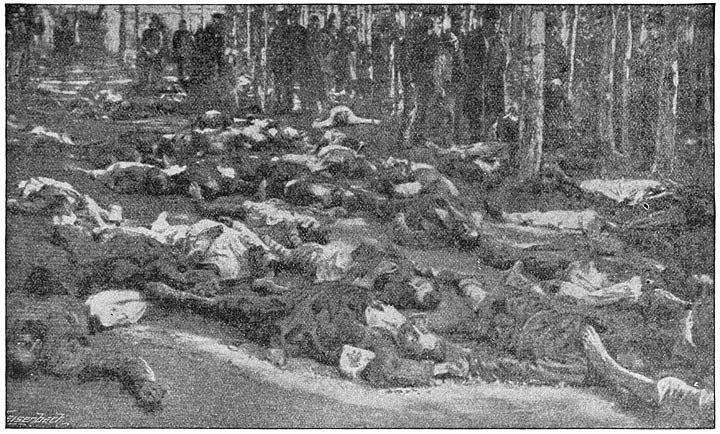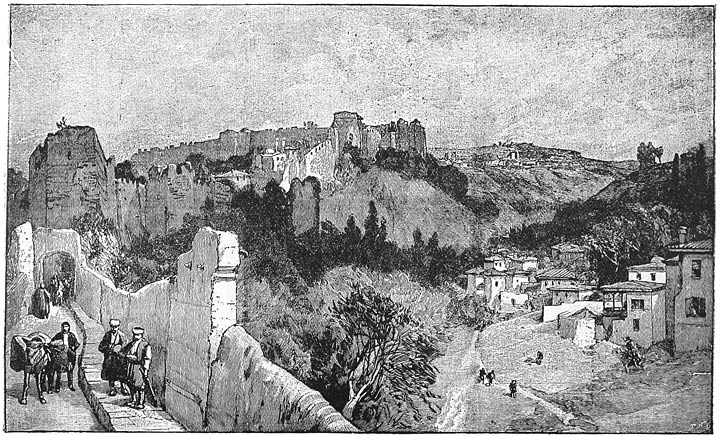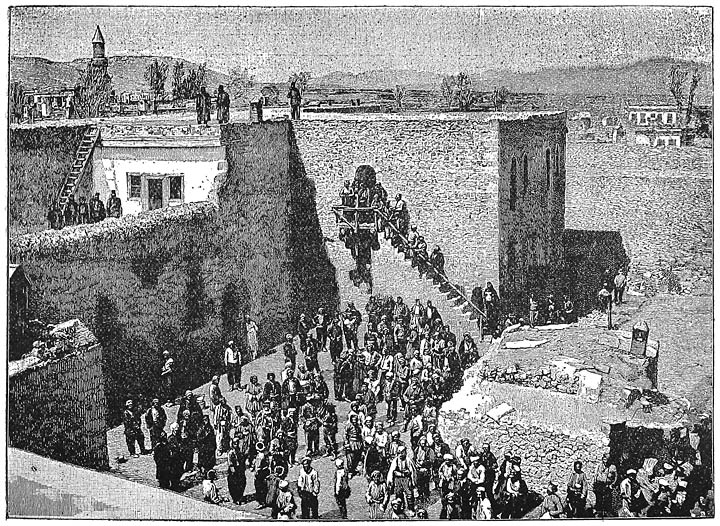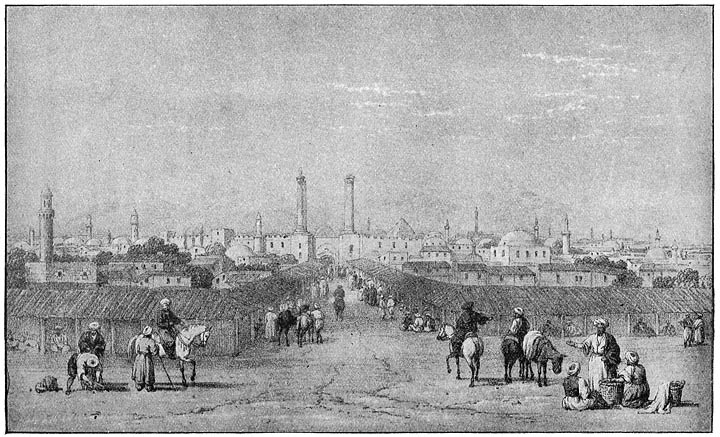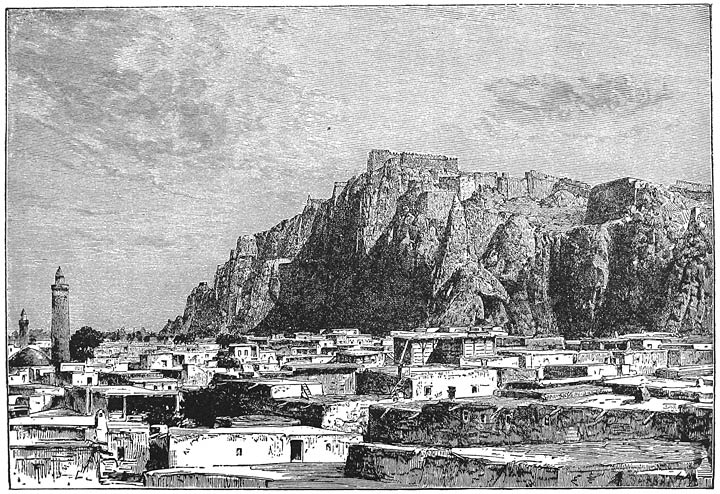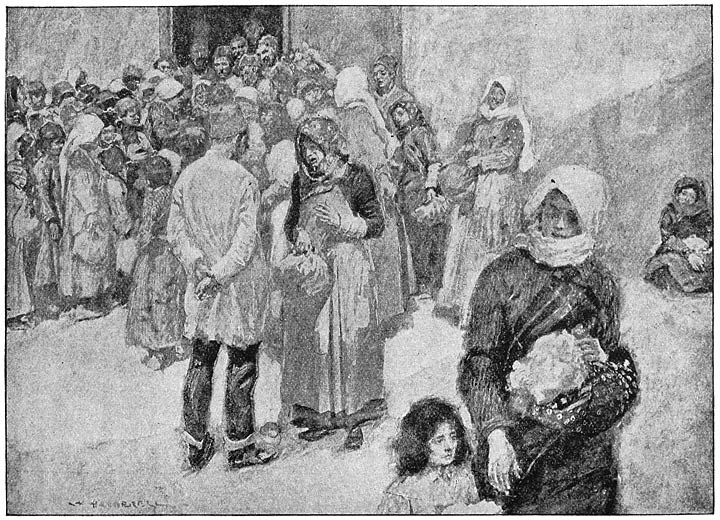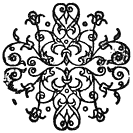It does not lie within the plan of this volume to
review at any length the history of Turkey, or to sketch the lives of
the Sultans who have reigned during the century; it will answer,
however, to make our work intelligible and clear, if the life of the
reigning Sultan of Turkey, Abdul Hamid II. is presented briefly.
He is the second son of Abdul Medjid, who was Sultan
from 1839 to 1861. He was born September 5th, 1842; and his mother
having died when he was quite young, he was adopted by his
father’s second wife, herself childless, who was very wealthy and
made him her heir. His early life was quiet and uneventful; his boyhood
was a continual scene of merry idleness. His education consisting
mostly in amusements and tricks devised for his entertainment by the
court slaves: and in an unusually early and complete initiation into
the depravities of harem life. Indeed up to manhood all the learning he
had acquired, amounted to but little more than the ability to read in
the Arabic and Turkish tongues. His mother had died of consumption and
his constitution was delicate. He had inherited a taste for drink, but
his doctor who was a Greek, assured him it would be his destruction.
“Then I will never touch wine or liquor again,” said Abdul
Hamid, and he kept his word.
The turning point in his life came, when in 1867 his
[214]Uncle Abdul Aziz, then Sultan, took his own son
and his two nephews, Murad and Hamid, to the Paris Exposition, England
and Germany. He saw with a quick and appreciative eye. He acquired a
taste for political geography, and for European dress, customs and
interests. What he then learned was to modify very considerably the
subsequent course of his life. From April, 1876, both he and his
brother Murad were kept under strict surveillance and not allowed to
take any part in the political movements going on in
Constantinople.
Abdul Aziz, the reigning Sultan, was determined to defy
the Turkish law of succession and proclaim his son in June, as heir
presumptive to the throne, thus displacing Murad and Hamid, who both
were before him in rights of succession. At this crisis, Midhat Pasha,
the leading and most progressive statesman and strong adherent of
Murad, planned a revolution and Abdul Aziz, was deposed and Murad was
proclaimed Sultan, May 31st, and so recognized by the Western powers:
but he was never girded with the sword of Othman in the Mosque of
Eyout, a ceremony equivalent to a Western Coronation.
His ill-health, increased by excessive use of liquor and
the mistaken treatment of his physician, rendered him mentally
incapable of ruling: though a celebrated Dr. Liedersdorf, sent for from
Vienna, is said to have stated, “If I had Sultan Murad under my
own care in Vienna, I would have him all right in six weeks.”
In consequence of this mental indisposition, Murad V.
was deposed August 30th, and Abdul Hamid II. was proclaimed on August
31st, and girded with the [215]sword of Othman a few days later.
He was then living in a small palace in the Valley of Sweet Waters,
which he inherited from his father. He was very fond of agriculture,
and amused himself by cultivating a model farm. To his mother, who is
said to have been an Armenian from Georgia, in Russia, he owed a
quality very rare in the family of the Sultans, the spirit of economy.
He never allowed his expenses to exceed his income before he came to
the throne. In this charming retreat he resided quietly with his wife
and two children, all eating at the same table, and showing in his
dress and surroundings his preference for European modes of life. The
only concession he made to Orientalism in personal dress, was in
wearing the “fez,” which he disliked, but continued to wear
as the necessary token of his nationality.
Six weeks after he was proclaimed Sultan, it was
announced that a scheme of reform for the whole Ottoman Empire, was in
course of preparation. It was published in January, and while it was a
much less sweeping reform than Midhat wished, it provided for a Senate
and a House of Representatives, which last was to take control of the
finances, the system of taxation was to be revised and better laws were
to be enacted for the provinces.
Election to the lower house was to be by universal
suffrage; for the upper house electors were restricted to two classes:
the noble and the educated.
Abdul Hamid cordially disapproved of this check on the
absolute power enjoyed by predecessors.
He was willing to do justice and to temper it with
mercy, but to be placed in the position of a servant to his people was
odious to himself. [216]
At a council held, when only his other ministers were
present, the Sultan asked, what should be done with Midhat Pasha. Two
of those present said: “Let him die.” But Abdul Hamid was
not bloodthirsty, hence he only banished him to Arabia where two years
later he was poisoned.
The Sultan was restive under the constitution and the
Pashas, against whose cruelty and extortion the most of the reforms
were aimed, sided with their sovereign. In 1875, Midhat Pasha had
outlined the situation thus to the English Ambassador:
“The Sultan’s Empire is being rapidly
brought to destruction; corruption has reached a pitch that it has
never before attained. The service of the state is starved, while
untold millions are being poured into the palaces and the provinces are
being ruined by the uncontrolled exactions of the Governors who
purchase their appointments at the palace: and nothing can save the
country but a complete change of system.”
And the very worst governed portion of all his Empire
was Armenia. We are officially told that its government for the last
thirty years has been horrible.
In an Armenian village recently plundered by bandits,
the famous Hungarian Professor, Arminius Vambery, an intimate friend of
the Sultan, once asked, “Why do you not get help from the
Governor of Erzeroum?” “Because,” answered the
villagers, “he is at the head of the robbers. God alone and his
representative on earth—the Russian Czar, can help us.”
This brigandage, is one of the greatest curses of the Turkish Empire,
exercising a rule of terror and oppression, and now legalized,
apparently, by the transformation of [219]the Kurdish
horsemen—robbers—into the Hamidieh—the Sultan’s
own Cavalry.
Such being the spirit of the Pashas who had grown rich
by plunder and official theft, of course they were opposed to the
Constitution, and by the will of the Sultan it was abrogated after two
sessions had been held. This was soon followed by the dismissal of the
Ministers who had formed the triumvirate, and the Sultan resumed his
despotic and absolute sway. Assured that England would not suffer the
dismemberment of his Empire we have seen him refusing to guarantee the
enforcement of promised reforms and provoking the war with Russia; but
as we have already told this story, we will give some pictures of the
Sultan as drawn by his admirers; leaving the horrors of the Armenian
massacres to bear witness as to the honesty of his professed devotion
to the welfare of his Christian subjects and his promises to observe
the terms of said treaty in the amelioration of the condition of all
who were suffering under the murderous oppression of Kurds and
Circassians.
Professor Vambery, a most remarkable linguist who writes
and speaks all the languages of Europe like a native, spent some time
in Turkey a few years ago and was received into closest conference by
the Sultan.—Here are extracts from what he has written of
him:
“I must own that the education of Abdul Hamid,
like that of all Oriental princes was defective, very defective indeed;
but an iron will, good judgment and rare acuteness have made good this
short-coming; and he not only knows the multifarious relations and
intricacies of his own much tried Empire but is thoroughly conversant
with European politics: and I am [220]not going far from fact when
I state that it has been solely the moderation and self-restraint of
Sultan Abdul Hamid which has saved us hitherto from a general European
conflagration. As to his personal character, I have found the present
ruler of the Ottoman Empire of great politeness, amiability and extreme
gentleness. When sitting opposite to him during my private interviews,
I could not avoid being struck by his extremely modest attitude, by his
quiet manners and by the bashful look of his eyes. * * At his table,
though wine is served to European guests, it is not offered to the
Sultan or any other Mohammedan.
“His views on religion, politics and education
have a decidedly modern tone, and yet he is a firm believer in the
tenets of his religion, and likes to assemble around him the foremost
Mollahs and pious Sheiks on whom he profusely bestows imperial favors;
but he does not forget from time to time to send presents to the Greek
and the Armenian patriarchates, and nothing is more ludicrous than to
hear this prince accused by a certain class of politicians in Europe of
being a fanatic and an enemy to Christians,—a prince who by
appointing a Christian for his chief medical attendant and a Christian
for his chief minister of finance, did not hesitate to intrust most
important duties to non-Mohammedans. * * *”
[Doubtless he wanted the best men he could find as his
physician and minister of finance, and these men were found among the
Christians. Let the last year tell whether he be the friend or the
enemy of the Christians.]
“In reference to the charge of ruthless despotism
laid upon Sultan Abdul Hamid in connection with his [221]abrogation of the charter granted during the
first months of his reign, I will quote his own words. He said to me
one day:—‘In Europe the soil was prepared centuries ago for
liberal institutions, and now I am asked to transplant a sapling to the
foreign, stony and rugged ground of Asiatic life. Let me clear away the
thistles, and stones, let me till the soil, and provide for irrigation
because rain is very scarce in Asia and then we may transport the new
plant; and believe me that nobody will be more delighted at its
thriving than myself.’”
Thus far the professor. And now, it is to be wondered if
he calls the extermination of the Armenians the clearing away of the
thistles and does he propose to irrigate the soil of Armenia with the
blood of its noblest race. Is he not rather slitting the veins of Asia
Minor and pouring out its heart’s best blood?
That the Sultan was a warm personal friend of Gen. Lew
Wallace does not make him any the less a despot; neither because Hon.
S. S. Cox, who succeeded Gen. Wallace was an admirer of the Sultan as
the following quotation will show; does that make him the less a
fanatic and the most remorseless shedder of blood that Europe has seen
since the days of Tamerlane.
“The Sultan is of middle size and of Turkish type.
He wears a full black beard, is of a dark complexion and has very
expressive eyes. His forehead is large, indicative of intellectual
power. He is very gracious in manner though at times seemingly a little
embarrassed. * * *
“As Caliph he is the divine representative of
Mohammed. His family line runs back with unbroken links to the
thirteenth century. He is one of the most industrious, [222]painstaking, honest, conscientious and vigilant
rulers of the world. He is amiable and just withal. His every word
betokens a good heart and a sagacious head. [What a comment the horrors
of the many months just past furnishes to this flattering estimate a
Mohammedian conscience!]
“He is an early riser. After he leaves his
seraglio and has partaken of a slight repast his secretaries wait on
him with portfolios. He peruses all the official correspondence and
current reports. He gives up his time till noon to work of this
character. Then his breakfast is served. After that he walks in his
park and gardens, looks in at his aviaries, perhaps stirs up his
menagerie, makes an inspection of his two hundred horses in their fine
stables, indulges his little daughters in a row upon the fairy lake
which he has had constructed, and it may be attends a performance at
the little theatre provided for his children in the palace. At 5 P. M.
having accomplished most of his official work, he mounts his favorite
white horse, Ferhan, a war-scarred veteran for a ride in the park. The
park of the palace Yildiz where he lives comprises some thousand acres.
It is surrounded by high walls and protected by the
soldiery.”
But all this does not tell us what the man at heart is
any more than if some flatterer of Nero should expatiate on the
esthetic taste of Nero and his love of the fine arts and his skill as a
violinist when he sat at night in his marble palace and enjoyed the
blazing magnificence of Rome. It is as foreign to the present situation
as if some one should praise the skill of Nero’s horsemanship as
he drove his mettled steeds with firm reins along the course lighted by
the blazing torches [223]of the tar-besmeared Christians, whom he
accused of having set the city on fire.
The persistence with which the Sultan has followed out
his purpose of exterminating the Armenians, in the face of a horrified
and indignant Christendom, marks his audacity and contempt of
Christians as sublime in height, as infernal in spirit, and bottomless
in its cruelty.
Gibbon in his Decline and Fall of the Roman Empire can
scarcely find polite words enough to express his contempt for the forms
of early Christianity and praised the Turks as possessing the rarest of
qualities when he said: “The Turks are distinguished for their
patience, discipline, sobriety, bravery, honesty and modesty,”
and Hon. Sunset Cox echoed the same when he wrote, “It is because
of these solid characteristics, and in spite of the harem, in spite of
autocratic power, in spite of the Janissary and the seraglio that this
race and rule remain potent in the Orient. His heart (the heart of the
present Sultan) is touched by suffering, and his views lean strongly to
that toleration of the various races and religions of his realm, which
other and more boastful nations would do well to imitate.”
The facts given in the chapters on The Reign of Terror
will be sufficient commentary on such praise.
Probably no building in all Europe has so many
associations with tragical events as that of the palace of the Sultan
of Turkey—the autocrat whose rule is absolute over more than
thirty million subjects. From this palace go forth the edicts which
involve the death of thousands and which control the governments of
distant provinces. Fifty years ago the Sultans governed a huge
territory in Europe, but one province after another [224]has
been freed from their yoke, until Turkey in Europe has dwindled in size
to less than half its former area. But the Asiatic possession of the
Sultan have not diminished, and the events in Armenia which have
recently horrified the whole world, show what that possession means.
Nor are these massacres a new or unparalleled feature of Turkish rule.
Similar horrors have been perpetrated before under the cognizance of
the Sultans and the only reason why the indignation now aroused on the
subject is deeper and more intense, is that it is now impossible to
conceal them, and in the days of the telegraph and cheap newspapers
they are set in the light of publicity. The Turk is no worse now than
he has always been, and is only trying to govern at the end of the
nineteenth century as he governed in the sixteenth. As an eminent
writer has said: “The Turk is still the aboriginal savage
encamped on the ruins of a civilization which he destroyed.”
In some respects Abdul Hamid is better than his
predecessors, and until the reports of the Armenian horrors were
published, he was believed to be a great deal better; but they have
proved that he has the same nature, and is at heart as fierce and
relentless as they. The character of the man is of so much greater
moment to his subjects than in other lands, because of the utter
absence of even the semblance of constitutional government. The
government of Turkey is a despotism pure and simple. It is tempered
only by the dread of assassination or deposition, and even those
calamities may come rather from a wise and merciful policy than from
massacre. The Pashas who surround the Sultan, the successors of those
who deposed his uncle and his brother, applaud the atrocities,
[225]and are willing instruments in the perpetration
of them. The danger to the Sultan’s person is far more likely to
come through weakness and lack of vigor in persecution than from
indignation at wholesale slaughter. The Sultan fully appreciates this
fact, and lives in constant dread of treachery.
An interesting story of the present Sultan is related by
Mr. W. T. Stead, in an article in his Review of Reviews, which
in some measure explains the singular mixture in his character of
fanaticism, such as that which produced the Armenian massacres, with
the marked ability and intelligence he displays in the conduct of
national affairs. It appears that when he was a mere youth, he was
conspicuous even in Constantinople, which is notorious for its
immorality, for the gross excesses of his private life. There was then
little probability of his ever ascending the throne, and as he was
condemned by his position to a life of idleness, he plunged into all
the wickedness of the capital, and lived a life of debauchery. Suddenly
he changed his course. He quitted his evil ways and became a devout
follower of Mohammed, was attentive at the Mosque and gave all his
thoughts to his religion. From that time until now his religious
enthusiasm has been the most prominent feature of his character. But
with the change came a fierce intolerance, a desire that others should
follow his example and determination, evinced since his accession, that
in his own dominions no enemy of the Prophet, nor any who did not avow
themselves his followers, should have peace or rest until they accepted
the faith. This spirit accounts for the crusade against the Armenians
whom he hates because they are Christians. [226]
The real cause for all the trouble in the Turkish Empire
will be found to lie within the spirit and purpose of the Sultan
himself. His conduct towards the Powers will serve to most abundantly
confirm this view.
The condition of Armenia under Turkish rule has for many
years been a scandal to Christendom. After the horrors of the Blood
bath of Sassoun had been made known to the world a commission of the
Powers were sent to investigate and report on the massacres which had
been perpetrated.
The investigation of the latest atrocities showed that
the Armenians had been wantonly tortured and murdered, and that
indescribable atrocities had been perpetrated. Men, women, and children
were proved to have been hacked to pieces, and no respect had been
shown to age or sex. Whole villages had been depopulated, and the fact
of any community being Christian seemed to have been sufficient to
provoke the murderous hostility of the authorities. Where the Turks did
not commit the outrages themselves, they remained inactive while the
Kurds committed them, and their inactivity amounted to connivance,
because the Armenians are not allowed to arm themselves for their own
protection. There was legitimate grounds for foreign powers urging
reforms upon the Sultan, as in 1878, when the Berlin Congress was
inclined to strip him of his Armenian provinces, he promised that
Armenia should be governed better than it had been, and England became
sponsor for the performance of his promises. Under those conditions the
Sultan was allowed to retain the provinces, and his failure to effect
the reforms was therefore a distinct breach of faith. The [227]Ambassadors of England, France and Russia
accordingly presented to the Sultan on May 11th a demand for twelve
specific changes in the government of Armenia. The scheme outlined
included the appointment of a High Commissioner, with whom should be
associated a commission to sit at Constantinople, for the purpose of
carrying out all reforms. The full details of the plan were not made
public, but among the suggestions made were these: The appointment of
governors and vice-governors in six Armenian vilayets—Van,
Erzeroum, Sivas, Bitlis, Harpoot, and Trebizond; that either the
governor or the vice-governor of each vilayet should be a Christian;
that the collection of taxes be on a better basis; with various other
reforms in the judicial and administrative departments: especially that
torture should be abolished; the gendarmérie to be recruited
from Christians as well as Mohammedans, and the practical disarmament
of the Kurds. Note the names of these vilayets as they are the centers
of the horrible massacres that followed the Porte’s true answer
to all its own promises of reform.
To this project of reforms the following memorandum was
attached:—
“The appended scheme, containing the general
statement of the modifications which it would be necessary to introduce
in regard to the administration, financial and judicial organization of
the vilayets mentioned, it has appeared useful to indicate in a
separate memorandum certain measures exceeding the scope of an
administrative regulation, but which form the very basis of this
regulation and the adoption of which by the Porte is a matter of
primary importance.” [228]
These different points are:
1. The eventual reduction of the number of vilayets.
2. The guarantee for the selection of the valis.
3. Amnesty for Armenians sentenced or in prison on
political charges.
4. The return of the Armenian emigrants or exiles.
5. The final settlement of pending legal proceedings for
common law crimes and offences.
6. The inspection of prisons and an inquiry into the
condition of the prisoners.
7. The appointment of a high commission of surveillance
for the application of reforms in the provinces.
8. The creation of a permanent committee of control at
Constantinople.
9. Reparation for the loss suffered by the Armenians who
were victims of the events at Sassoun, Talori, etc.
10. The regularization of matters connected with
religious conversion.
11. The maintenance and strict application of the rights
and privileges conceded to the Armenians.
12. The position of the Armenians in the other vilayets
of Asiatic Turkey.
After much delay the Porte replied that it could not
accept the proposals made. Of course not. Why should the Sultan do
anything to favor the Armenians or even to prevent the recurrence of
these terrible outrages unless compelled to do so by something more
than advice! Yet the Sultan would be anxious to know what the three
Powers would do about it. He was not kept long in suspense, so far as
England was concerned. Orders were issued for the English fleet to
proceed to Constantinople, and France and Russia were informed of the
fact. The news reached the Sultan [229]and appears to have convinced
him that it was not safe to trifle any longer with the demands of the
powers. He accordingly telegraphed that he would accede to the
principle of reform outlined for him.
The Sultan, learning also that the British Cabinet had
met to consider Turkey’s reply to the plan of reform for Armenia,
submitted by Great Britain, France and Russia, telegraphed to Rustem
Pasha, the Turkish Ambassador in London, instructing him to ask the
Earl of Kimberly, the British Foreign Minister, to postpone a decision
in the matter.
The Earl of Kimberly acceded to the request. In the
meanwhile the Porte handed to the British, French and Russian
Ambassadors a fresh and satisfactory reply, acceding to the principle
of control by the Powers, but asking that the period be limited to
three years.
While these promises were being so freely made, letters
from Armenia, in July, represented Turkish cruelty as unabated; the
position of affairs never so grave and critical; and the Armenians to
have reached the ultimate limit of despair. Yet in August the world was
informed that Turkey had decided to accept in their entirety the
Armenian reforms demanded by the Powers, and that the acceptance of
these reforms was primarily due to the pressure brought to bear on the
government by Sir Philip Currie, the British Ambassador, who
communicated to the government a confidential note from Lord Salisbury
to the effect that the Porte must accept the proposals of the powers
unconditionally, or England would use sharper means than those adopted
by Lord Rosebery to settle affairs in Armenia. [230]
The summer passed in fruitless and endless negotiations.
Later in September a press telegram from London voiced the situation as
follows:—
“European diplomacy seems already weary of the
question, which Turkish diplomacy has handled with an evident ability,
based upon temporization and inertia, as well as upon its knowledge of
the jealousy existing between the three Powers which proclaim so loudly
that they want nothing else but the happiness of the Armenians.
“The question has not progressed one iota, despite
all the negotiations, memoranda, appointments of commissions, and even
the (awful!) rumor, one month ago, of the assembling of the British
fleet in Besika Bay, at the entrance of the Dardanelles. England,
France and Russia, however, had the way clear before them, if they had
been really in accord and seriously willing to accomplish the
humanitarian mission they pretended to assume. Article sixty-one of the
Berlin Treaty gave the Powers the right to see that the same rights
granted to Bulgaria should be granted also to Armenia. This article has
remained a dead letter in regard to the latter country since 1878. When
the Sassoun atrocities were recently committed, the Powers merely sent
to the Porte a memorandum, requesting it to cease its persecution of
Armenians. During two or three months the European Ministers at Pera
awaited the decision of the Sultan. Whenever they sent their dragomans
to the Foreign Minister, Said Pasha caused his secretary to answer in
the Spanish manner, ‘hasta la
mañana’ (to-morrow a reply will be given). Finally
the three Powers thought of using the rights conferred upon them by
Article sixty-one, and required Abdul Hamid to consent [231]that
a European Commission of Control should be sent to Armenia, in order to
see that reforms be practically applied there. The Sultan will fight
stubbornly before accepting them, which would amount to the abandonment
of a portion of his sovereignty, and it remains to be seen how much the
Powers, jealous of their respective influence at the Porte, are in
earnest and how anxious they are promptly to enforce the acceptation of
their Control Commission.”
The Turks continued to play a waiting game in Armenian
affairs. Remembering the treaty of Berlin, they were shrewd enough to
play off one Power against another so as to retain absolute control
over their internal affairs, though they had forfeited all right to
rule by their outrageous and brutal massacres. The Congress of Berlin
was at the time a costly thing to the Eastern Christians but was
destined to prove almost their utter ruin.
The Turks did not find it hard to pick flaws in the plan
of administrative reform when they did not intend to have any reform.
The whole scheme was without any security against the renewal of the
Sassoun massacres. Everybody who was interested in Armenia protested
against the plan, but it was the best that mere diplomacy could do.
Thus the summer passed filled with plenty of promises,
but without any fulfilment, until suddenly the signal was given and the
horrors of Sassoun were reënacted throughout all the provinces of
Armenia.
At a mass meeting of Armenians held in New York, free
expression was given to the feeling of horror with which the news of
the Turks’ outrages was received there. There seemed to be no
doubt in the minds of these [232]people as to the truth of the
reports from Asia Minor, and many were of the opinion that still more
terrible news would be received. Mr. Dionian presided, and in calling
the meeting to order, said that Armenia and Turkey could never be
friends, and that Armenia must either be liberated or annihilated.
Dr. P. Ayvard also spoke, and then Dr. S. Aparcian
offered resolutions, which were unanimously adopted, saying in
part:—
Resolved, That we most respectfully and
appealingly call upon all the great Powers of Europe, and of our
adopted and well loved country of America, to the deplorable condition
of Armenia, and trust that the moral interests of Europe will demand
taking immediate steps to put an end to this rule of anarchy and
lawlessness prevailing there, and that the United States of America
will give their moral support.
Knowing the Turk as they did, the Armenians in this
country were prepared for the confirmation of these reports. In due
time it came.
A prominent Turk laughed when he saw the report, and
said it was a mere fabrication, and that if there was any slaughter it
was not committed by the Turks. As to the Turks being opposed to the
Armenians because of their being Christians, he said: “People who
have lived in the Orient know that to be absurd. We have Christians and
Jews among us, and as long as they obey the laws of the land they are
treated the same as the members of our faith. Of course,” he
added, “when people become revolutionists and conspire against
our Government, then we take measures to punish them. The Armenians are
revolutionists, and their revolutionary societies exist in every city
in this country, while the head-centre is at Naples.”
[233]
The Turk laughed and blamed the Armenian revolutionists.
The Porte denied the outrages at first then charged the trouble to the
Armenians, until the terrible situation at Trebizond and Erzeroum could
no longer be kept from the knowledge of Christendom. The prisons in
Trebizond were filled with wounded and helpless Armenians: the
Mohammedans were well armed and the governor entirely in sympathy with,
even if not the instigator of the outrages.
Meanwhile the European manager of the United Press at
Constantinople gave the first detailed account of the appalling
massacres to which Armenian Christians had been subjected since the
Sultan Abdul Hamid gave perfidious assent to the reforms demanded by
the European Powers. The harrowing and shameful facts were told on the
authority of American Christian men, who witnessed them, and their
narrative had the unqualified endorsement of Mr. Terrell, the United
States Minister to Turkey. In view of such conclusive testimony to the
duplicity and faithlessness of an incorrigible ruler, it seems
incredible that Christian peoples will let their rescuing hands be
stayed any longer by sordid jealousy and greed, or that they will any
longer consent to bear a share of the responsibility for such crimes
against humanity. The blood of the slaughtered thousands of their
fellow Christians in Armenia cries against them from the ground.
By this trustworthy evidence the conclusion was
justified that within the six provinces mainly concerned in the
proposed reforms, no fewer than fifteen thousand Armenians were
assassinated, while the number of those rendered homeless and robbed of
all their possessions, did not fall short of two hundred thousand.
[234]The places and dates exposed the aim of the
hellish atrocities committed, and drove home the guilt to their authors
and accomplices. On October 20, the Sultan authorized Kiamil Pasha, his
Grand Vizier, to accept the reforms proposed for the Armenian provinces
by the European Powers, and to promise that they should be forthwith
carried out. On the next day, October 21, when there had been ample
time for the reception of orders telegraphed from Constantinople, the
Kurds and Turks throughout Armenia, openly incited and assisted by the
regular troops, entered on a scheme of wholesale murder and
devastation. The purpose of this preconcerted iniquity, as disclosed by
its disgraceful antecedents and its horrible results, was to vent upon
the helpless Armenians the venom and the spite engendered by enforced
submission to the will of the Christian Powers. It was to enforce at
one vindictive stroke the programme of extermination devised in 1890,
but prosecuted hitherto with some show of secrecy and caution. It was
to make of Armenia a solitude, and then with satanic mockery, to offer
exact fulfilment of the pledge of peace and of reform.
All the circumstances showed that with this flagitious
rupture of the Sultan’s plighted word, the person directly and
primarily chargeable was the Sultan himself. He sanctioned the plot of
extermination, if he did not personally concoct it in 1890, the
relentless though disavowed execution of which at last provoked the
interposition of Christian Powers. No sooner had Kiamil Pasha been
reluctantly permitted to agree to the reforms exacted for Armenia, than
he was summarily dismissed by Abdul Hamid from the Grand Vizierate,
lest he should [237]execute the agreement in good faith. The new
Ministers selected by the Sultan were drawn mainly from the scum of
Constantinople, and their first act was to protest that time must be
given to the Porte for the proper enforcement of the reform project.
Time was needed to render reforms superfluous through the sweeping
destruction of its intended beneficiaries. It was needed to perpetrate
the design of annihilation on a scale of vast proportions. The Sultan
well wished to hide his privity to such a devilish transaction, but he
dared not disavow his agents, lest they should divulge his
instructions. Accordingly, when high Turkish officials, unmistakably
implicated in the Armenian enormities, were subjected to the nominal
penalty of a recall at the imperative instance of England’s
representative, they were decorated and promoted by Abdul Hamid, whose
secret aims and wishes were thus betrayed.
On November 10, the Kurds made an attack on Harpoot, but
were easily repulsed. On November 11, a party of the soldiers and
leading Turks met the Kurds in conference, during the progress of which
a bugle was sounded, at which signal the soldiers withdrew. The Kurds
thereupon advanced with yells. There was no effort on the part of the
soldiers and Armenians to resist, and the Turks joined in the killing
and plundering. The Armenian school was burned, and then began an
attack upon the Christian quarter, the buildings in which were also set
on fire. The Christians were without weapons of any sort, and trusted
entirely to the Government to protect them. The Armenians remained in
the girls’ seminary until that building was set on fire, and then
they appealed to the Governor for protection. They obtained a guard of
soldiers, all but [238]two of whom afterward deserted. These two
remained and carried out the orders issued to them, to fight the fires
which had been kindled.
The burning continued for three days. The Armenians were
stripped of everything but their clothing. All the Christian villages
around were burned by the Kurds. The outrages continued unchecked until
the Government at Constantinople ordered the troops to take action.
Fourteen Kurds were then shot, when the murders and pillaging ceased
instantly. The districts of Diarbekir, Malatia, Arabkir, Kyin and Palu
were made desolate. Thirty-five villages were destroyed, and thousands
of the inhabitants embraced Islamism in consequence of the pressure
brought to bear upon them.
The Turkish troops which were on their way to Zeitoun to
suppress the trouble there, were concentrated at Marash, where they
awaited the return of the delegation sent to Zeitoun to negotiate with
the Armenians in control there for their surrender.
The Government said they were projecting more extensive
relief work, and would welcome foreign aid through a joint
commission.
Despite this promise of greater relief, the Government
was bent on continuing the work of extermination—all promises to
the contrary notwithstanding.
The tidal wave of horror and indignation swept over
Europe, and found expression in most intense and emphatic speech; it
was even felt in the Cabinets of Diplomacy and in Constantinople. There
seemed to be more iron in their blood and energy in their action and
purpose in their speech.
The general situation was not changed, but it was
[239]apparent that a change was about to take place.
The representatives of the Powers, some of whom were awaiting
instructions from their Governments in regard to the matter of sending
additional guardboats into the Bosphorus, seemed to be unanimous in
their insistence on the issue of permits for the admission of such
boats by the Sultan, and the Ambassadors held a meeting to consider the
situation as presented by the Sultan’s refusal to permit the
passage of the additional boats through the straits, and to decide on a
concerted plan of action.
For several days the wires were hot with the assertion
that all the Powers were united and determined to carry their demands
to a successful termination. The Sultan was unofficially informed that
if he continued to maintain his stubborn attitude, a forced entry of
the Dardanelles would possibly be made.
As previously, and with equal pertinence, at this hour
of crisis the continental press devoted much space to the affairs of
the Orient, and the Sultan was the recipient of much newspaper advice.
One writer in particular urged him to remain master of the situation,
and to show himself promptly disposed to fulfil his engagements. In
that case the crisis would remain an internal one; but if it should
assume an international aspect it would be peacefully adjusted on the
basis of the maintenance of the integrity of Turkey which would be
asserted by France and Russia, the two Pacific Powers. It was also
telegraphed from Constantinople that the Czar, in reply to a personal
appeal from the Sultan, consented to waive the Russian demand for a
second guardship in the Bosphorus. At the same time she was prepared to
[240]resent any aggressive action that England might
undertake alone.
The Sultan knew very well that there would be no
concerted action of the Powers—that England and Russia would
never agree as to any joint action, and yet to give color of necessity
to his refusal, it was given out that the Powers had decided to depose
him, using for this purpose the forces aboard the second guardship which
they demanded should be permitted to enter the Bosphorus. This was to
stir up the populace against the Powers. Then to furnish another excuse
the report was circulated that the Sultan was in daily fear of sharing
the fate of Ishmail Pasha at the hands of the Softas and the Young
Turkish party.
The Sultan’s letter to Lord Salisbury was often
quoted as a confirmation of the report that the Sultan was panic
stricken. It will be recalled that Lord Salisbury in his speech at the
Lord Mayor’s banquet on November 9th, declared that, if the
Sultan will not heartily resolve to do justice to them, the most
ingenious constitution that can be framed will not avail to protect the
Armenians; that through the Sultan alone can any real permanent
blessings be conferred on his subjects. “What if the
Sultan,” exclaimed the British Prime Minister—
“What if the Sultan is not persuaded? I am bound
to say that the news reaching us from Constantinople does not give much
cheerfulness in that respect. You will readily understand that I can
only speak briefly on such a matter. It would be dangerous to express
the opinions that are on my lips lest they injure the cause of peace
and good order.”
These words seemed to be freighted with some
[241]ominous significance, and they would have been,
if there had been any purpose to make them mean anything.
In a remarkable letter to Lord Salisbury which he read
publicly at a conference in London, the Sultan used a most beseeching
tone to show that the possible dissolution of his Empire was lying
heavy on his mind. It sounded like a most abject plea for mercy, a cry
for the postponement of the fate which the Powers seemed to be
preparing for the terrified monarch. In this note the Sultan said:
“I repeat, I will execute the reforms. I will take
the paper containing them, place it before me and see that it is put in
force. This is my earnest determination and I give my word of honor, I
wish Lord Salisbury to know this and I beg and desire his Lordship,
having confidence in these declarations, to make another speech by
virtue of the friendly feeling and disposition he has for me and my
country. I shall await the result of this message with the greatest
anxiety.”
It will be noted that the Sultan’s communication
contained no denial that there are wrongs to be remedied in the
administration of his government in Armenia and elsewhere. There is no
plea that the terms of solemn treaty obligations have been observed.
The letter is a tacit confession that the interposition of the Powers
as far as it had gone was justifiable and that the reports of the
atrocities in Asia Minor, which were at first strenuously denied by the
Turkish Government, were true.
It was only a shrewd plea of helplessness to persuade
the Powers not to enforce their demands and nothing more. In his
rejoinder to the Sultan’s letter, Lord [242]Salisbury substantially admits the hopelessness
of reform under the Sultan’s government as now constituted and
administered.
A few days after this correspondence the fear of the
Sultan seemed to have vanished, and he was brave enough to refuse
permission to the Powers to send extra guardboats into the
Bosphorus.
At this time it looked as if Sir Philip Currie, the
British Ambassador, would act alone, and that he really meant to force
the passage of the Dardanelles.
But the Sultan knew he would not dare to do it, and he
knew also that the Powers were not agreed to use force. England proved
herself impotent before the crafty diplomacy of the timid
Sultan.
It is folly at this day to pretend to believe that the
Sultan ever intended of his “spontaneous good-will” to
protect the Armenians even as human beings from the cruelty of Kurd or
Turkish officials.
The horrors of December and January give the lie direct
to every promise made at Constantinople. The Sultan had outwitted
England, if indeed England ever were in earnest, and by circulating a
rumor of a Turco-Russian alliance, most effectually checked all danger
of intervention by force—the only argument to which the Turk will
ever yield—and proceeded to commit yet greater crimes if that
were possible.
Under the very eyes of the Russian, English, and French
delegates at Moush, the witnesses who had the courage to speak the
truth to the representatives of the Powers were thrown into prison, and
not a hand was raised to protect them: and within a stone’s throw
of the foreign consuls and the missionaries, loyal Armenians were being
hung up by the heels, the hair of their heads [243]and
beards plucked out one by one, their bodies branded with red-hot irons,
and defiled in beastly ways, and their wives and daughters dishonored
before their very eyes. And all that philanthropic England has to offer
its protégés, for whose protection she holds Cyprus as a
pledge, is eloquent sympathy.
She received Cyprus by secret convention, and now holds
it as the price of innocent blood. The rewards of iniquity are in her
hand. It was worse than folly; it was the refinement of cruelty to send
a commission to investigate the outrages in Armenia, thereby irritating
the Turk to the height of possible fury as his deeds were proclaimed to
the world and then leave him free to wreak his compressed wrath upon
the Christians for whose protection no hand would be uplifted. The
Powers saw Armenia in misery, bleeding, dying, and passed by on the
other side, saying, we are bound by the terms of the Berlin Treaty not
to interfere with Turkey in the administration of her domestic affairs;
we are sorry for you; we wish the Sultan would listen to our advice and
not be quite so severe in his chastisement, but really you must have
given him some cause for his anger.
Yes, such provocation as the lamb gave to the wolf that
charged it with soiling the water, though it was drinking much farther
down the stream.
The humiliation of England as one of the Great Powers
was complete when in the House of Commons March 16th, in reply to
questions that were put to him Mr. Curzon Under Secretary of Foreign
Affairs was obliged to say that reports received by the Government
confirmed the statements that a great number of forced conversions from
Christianity to Islamism were still [244]being made in Asia
Minor. Under the circumstances of cruelty and systematic debauchery of
defenceless Christian women through the devastated districts of
Anatolia, he said, the British Consuls in Asia Minor had been
instructed to report such cases, and representations in regard to them
were constantly being made to the Government in Constantinople.
Representations were constantly being made! What did the
Porte care for representations? How England was compelled to quaff the
contempt even of the Turk who laughs or sneers as his mood may be over
these representations of English Consuls and missionaries. The Sublime
Porte—which means the Sultan—cabled the Turkish Legation at
Washington to deny most emphatically the statements that appeared in
the American religious press regarding forcible conversions to
Islam.
The Sublime Porte affirmed that “the stories
related therein are mere inventions of revolutionists, and their
friends intended to attract the sympathy of credulous people. There is
no forcible conversion to Islamism in Turkey and no animosity against
Protestantism.” This is sublime impudence. The statements thus
contradicted, represented conditions certified to by official reports,
by careful investigations made by correspondents of newspapers in
England and the United States, and by hundreds of private letters from
persons in the region where the massacres occurred. Moreover, this
declaration of the Sultan is contradicted by centuries of Mohammedan
history, by the ruins of ancient churches throughout all Asia Minor and
Mesopotamia, and by daily prayer concerning the Christians:—
“Oh Allah make their children orphans, * * give
[245]them and their families * * their women, their
children, * * their possessions and their race, their wealth and their
lands as booty to the Moslems, O Lord of all creatures.”
The Softas are, properly speaking, the pupils who are
engaged in the study of Mussulman theology and law in the medresses, or
schools attached to the mosques, the range of their studies, however,
being practically limited to learning to read the Koran. The Softas
take their name from a corruption of the past-participle
soukhte—burned—applied to them because they are supposed to
be consumed by the love of study of sacred things, and devoted to a
life of meditation. The Softas follow their studies in the school
building, sleeping and eating at the imaretts, where free lodgings and food
are provided for them out of the legacies of the pious. If their
families can afford to do so, they furnish them with clothing and
bedding; if not, these are given to them from the same charitable fund.
The number of Softas is very large, for one reason because of their
exemption from military service. After long-continued study of Arabic,
and the Koran and its commentaries, the Softa, after an examination
which, though nominally arduous, is almost invariably passed
successfully, takes the title of Khodja.
The Khodja—khavadje, reader or singer—a
scholar who has taken his diploma in the medresse, teaches for several
years, in fact till he has conducted a class of Softas through the same
course he had himself taken, when, on application to the Ministry of
Worship, at whose head is the Sheikh-ul-Islam, and, after a severe
examination, he receives the title of Ulema. The Mussulman does not
arrive at this dignity until he has [246]reached the age of
thirty or thirty-five. It confers numerous privileges, for those
doctors escape military service, unless in the event of the djihad, or
sacred war, and from their ranks are filled the Judgeships, the
curacies (so to speak) of the mosques, the professorships in the
medresses, the trusteeships connected with the administration of the
trust funds for pious and charitable purposes, etc., etc.
The Imaums—who are the real priests and have
charge of the public religious service—are selected from among
the Ulema. The title of Imaum comes from the Arabic, and is the
equivalent of leader or outpost. There is as a rule one Imaum to each
mosque of minor importance—messdjid—while two, or, at most,
three, one of whom is designated the chief authority, are appointed to
the principal mosques—djamis. Even the Ulema—the word is
plural and signifies wise men—are subject to military duty when a
holy war is proclaimed.
The term Softa includes all the grades above mentioned,
from the Imaum, or priest, to the Softa proper, or mere students of the
Koran. They are usually distinguishable in Turkey by wearing a white
turban around their fez, or skull cap. Sultan Abdul Medjid some years
ago endeavored to induce his subjects to wear a European dress, and
succeeded so far that almost without exception every one except the
very lowest in the public service adopted it. But the Softas to a man
retain the old-fashioned baggy, slouchy dress which Abdul Medjid wished
to get rid of.
Who can believe that through fear of the uprising of a
few thousand Softas, the Sultan planned a fanatical uprising of the
Kurds in distant Armenia. How could [247]that benefit the
Softas save as it were permitted them to beat, kill and plunder the
Armenians in Stamboul?
If the fear of the Softas prompted it, still what a
heartless wretch to doom seventy-five thousand to death and hundreds of
thousands to starvation and outrage when to admit the fleets of Europe
would have protected him from any possible insurrection in
Constantinople.
The Turkish Government itself was directly and actively
responsible for the outrages in Asia Minor; it not merely permitted,
but actually ordered them. But there was in Constantinople itself a
most serious conspiracy against the dynasty, which threatened to turn
out the Sultan and revolutionize the whole form of government. As a
sort of counter-irritant, which haply might cure this, the Government
might have indeed resorted to any extravagance or conduct elsewhere.
More than one monarch has begun a foreign war to quell disaffection at
home. Why should not the Porte think a general harrying of the
Armenians a ready way of allaying incipient disloyalty among the
Faithful?
This conspiracy was made by what was known as the Young
Turkey party. It included most of the Softas, and students in all
colleges, and many lawyers, doctors, officers of the army and navy, and
even civil servants of the Porte. Back of these were multitudes of the
general populace. There were many who denied Abdul Hamid’s legal
right to be Sultan while his elder brother was living. There were
others, numbered by millions, who held that the Caliph must be an Arab
and that the Sultan was therefore not to be recognized as the true
Commander of the Faithful. Moreover, many, indeed all the leaders of
Young Turkey, demanded [248]the carrying out of the Hatt of
1877, establishing a Constitution and Parliament, and denounced the
suppression of that promised system as a gross breach of faith and
wrong to the people of the Empire. It may not be generally remembered;
men’s memories are so short; but it is a fact that a
constitutional government was once officially proclaimed in Turkey. The
plan was conceived by Midhat Pasha, then Grand Vizier, and formally
approved by the Sultan. A Constitution was promulgated. A Parliament,
consisting of a Senate and an elective Assembly, was created, and its
first session was opened by Abdul Hamid in person on March 19, 1877.
Later in the same year its second session was opened, and the Sultan
publicly declared that the Constitution should thenceforth be the
supreme law of the land, in practice as well as in theory. But before
the end of the year one designing politician managed to get Parliament
involved in a corrupt job, and then, to avoid investigation, persuaded
the Sultan to issue a decree abrogating the Constitution and abolishing
Parliament! It was a coup d’état, and it was
successful; thanks largely to the indifference of the Powers, and
especially of England.
The Young Turkey leaders demanded the restoration of the
Constitution. In order to accomplish that they proposed to get rid, in
some way, of the Sultan who first decreed and then abrogated that
instrument. There were threats of assassination, and something like a
reign of terror prevailed at Yildiz Kiosk. The Sultan took as many
precautions against treachery as ever did the Russian Czar. The man who
brought about the abolition of the Parliament by his rascality was a
cabinet minister. He, too, was threatened with [249]death. The strictest repression was practiced.
The merest hint was enough to cause a man’s arrest and summary
execution. But in spite of all, the revolutionary movement grew.
Mysterious placards appeared on the walls, calling for fulfilment of
the Hatt of 1877. The name of Midhat Pasha, who suffered martyrdom for
having given Turkey a Constitution, was spoken now and then, in
whispers only, but in tones of grateful reverence. A whisper of
“The Constitution,” too, went round. Army and navy were
becoming secretly leavened with the idea. The Sultan and his Ministers
did not know whom to trust.
And now that we have seen what a fiasco this brilliantly
projected great naval demonstration proved itself to be; and how
cleverly the Sultan played his pawns against Castles and Kings and
Queens, and checkmated all the Powers of Europe, we will leave him in
his hell of infamy bathed in the blood of nearly a hundred thousand
slain, with the voices of agonized and outraged mothers and daughters
raining maledictions upon his accursed head, while we try to be patient
until the rod of the Almighty shall smite the wicked, till the day of
reckoning and of vengeance shall come in the day of the Lord at hand.
We leave the Sultan in his palace to the companionship, perhaps the
guidance, of Khalil Rifaat Pasha, the new Grand Vizier, the voice of
history and the righteous judgments of God, but as for Islam, as a
system of government over Christian populations, we can but pray daily
for its speedy, utter and final overthrow. [250]


